
The Aegadian Islands are a group of five small mountainous islands in the Mediterranean Sea off the northwest coast of Sicily, Italy, near the cities of Trapani and Marsala, with a total area of 37.45 square kilometres (14.46 sq mi).
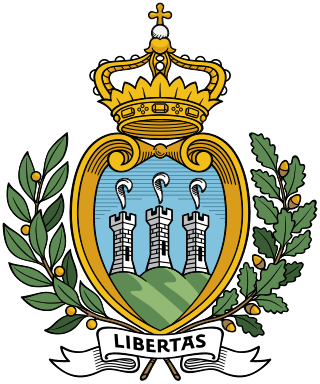
San Marino is an independent and sovereign member of the international community. It maintains an extensive diplomatic network relative to its diminutive size, as well as an active foreign policy and international presence.

Sicily is an island in the central Mediterranean Sea, south of the Italian Peninsula in continental Europe and is one of the 20 regions of Italy. With 4.8 million inhabitants, including 1.3 million in and around the capital city of Palermo, it is the most populous island in the Mediterranean Sea. It is named after the Sicels, who inhabited the eastern part of the island during the Iron Age. Sicily has a rich and unique culture in arts, music, literature, cuisine, and architecture. Its most prominent landmark is Mount Etna, the tallest active volcano in Europe, and one of the most active in the world, currently 3,357 m (11,014 ft) high. The island has a typical Mediterranean climate. It is separated from Calabria by the Strait of Messina. It is one of the five Italian autonomous regions and is generally considered part of Southern Italy.

Trapani is a city and municipality (comune) on the west coast of Sicily, in Italy. It is the capital of the Province of Trapani. Founded by Elymians, the city is still an important fishing port and the main gateway to the nearby Egadi Islands.

The province of Trapani is a province in the autonomous island region of Sicily, Italy. Following the suppression of the Sicilian provinces, it was replaced in 2015 by the free municipal consortium of Trapani. Its capital is the city of Trapani. It has an area of 2,469.62 square kilometres (953.53 sq mi) and a total population of 433,826 (2017). There are 25 comuni in the province.

The Florio family is a prominent entrepreneurial Italian family who started many lucrative activities in Sicily involving the export of Sicilian products in the 19th century, in some ways redeeming Sicily from feudal immobility. The family extended its interests to shipping, shipbuilding, fisheries, mining, metallurgy and ceramics. The Florio economic dynasty was one of the wealthiest Italian families during the late 19th century.

Favignana is a comune including three islands of the Aegadian Islands, southern Italy. It is situated approximately 18 kilometres west of the coast of Sicily, between Trapani and Marsala, the coastal area where the Stagnone Lagoon and the international airport of Trapani, are sited.

Marettimo is one of the Aegadian Islands in the Mediterranean Sea west of Sicily, Italy. It forms a part of the municipality (comune) of Favignana in the Province of Trapani. It takes about an hour to reach the island from Trapani.

Trapani–Birgi Airport, is a military air base and public airport serving Trapani, in Sicily, Italy. Located between Trapani and Marsala, it is one of the five civil airports in Sicily. In 2023, 1,332,368 passengers passed through the airport, making it the third-busiest airport in Sicily. The air base of the Aeronautica Militare in named after the aviator Livio Bassi. The civil airport is named after the Sicilian industrialist Vincenzo Florio Sr.

Pachino is a town and comune in the Province of Syracuse, Sicily (Italy). The name derives from the Latin word bacchus, which is the Roman god of wine, and the word vinum, which means wine in Latin; originally the town was named Bachino which eventually was changed to Pachino when, in Sicily, Italian became the official spoken and written language.

Isola delle Femmine is an Italian town in northwestern Sicily, administratively part of the Metropolitan City of Palermo.
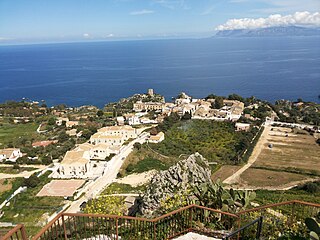
Scopello is a coastal village, in the municipality of Castellammare del Golfo in the province of Trapani in Italy.
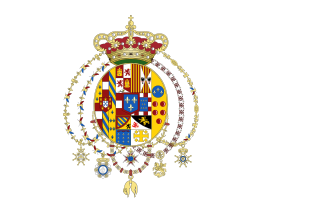
The Kingdom of the Two Sicilies was a kingdom in Southern Italy from 1816 to 1861 under the control of the House of Bourbon-Two Sicilies, a cadet branch of the Bourbons. The kingdom was the largest sovereign state by population and land area in Italy before the Italian unification, comprising Sicily and most of the area of today's Mezzogiorno and covering all of the Italian Peninsula south of the Papal States.
Fedeau Battery was an artillery battery in Mellieħa, Malta. It was built by the Order of Saint John in 1714-16 as part of a series of coastal fortifications around the Maltese Islands, and demolished in the 20th century.
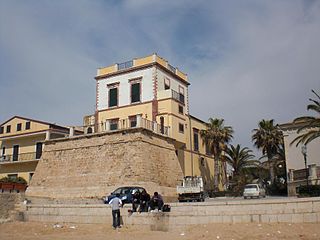
The Torre Cabrera, also known as Torre Mazzarelli, Torre della Dogana or Torre di Gaddimeli, is a 16th-century tower in Marina di Ragusa, a frazione of Ragusa, Sicily.
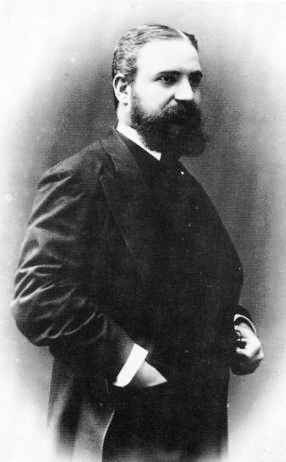
Ignazio Florio Sr. was an Italian entrepreneur and politician, member of the rich Florio economic dynasty, one of the wealthiest Italian families during the late 19th century.

Vincenzo Florio Sr. was an Italian entrepreneur and politician, member of the rich Florio economic dynasty, one of the wealthiest Sicilian families during the late 19th century.
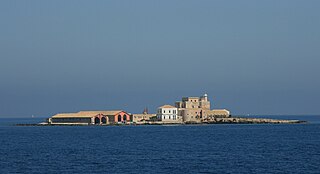
Isolotto Formica Lighthouse is an active lighthouse located on an islet, 302 metres (991 ft) long and 206 metres (676 ft) wide, at 4 nautical miles from Trapani in western Sicily on the Sicily Channel. The island is dominated by a quadrangular fortification, built by the Pallavicino in the mid 1600, and a Tonnara, built by the Florio in the mid 1800, which was closed in 1979. From the 1980s the island is a private property belonging to Mondo X which is involved in the recovery of drug addiction.
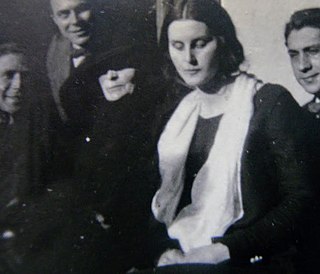
Elisa Johanne Rosa Maria Boglino was a Danish-Italian painter, active in Denmark and Italy.

Mattanza, literally 'slaughter' or 'killing' in Italian, also known as Almadraba in Spanish and Almadrava in Portuguese, is a traditional tuna fishing technique that uses a series of large nets to trap and exhaust the fish.



















